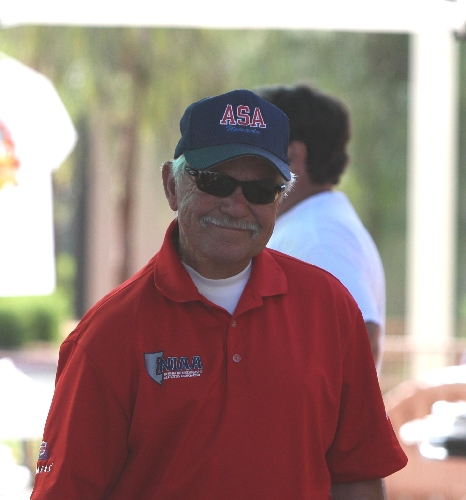Softball ump Lykins: man in charge to end

A close friend of Jim Lykins tells this story:
It was Friday, not 24 hours after Lykins had undergone surgery for lung cancer, when he telephoned about the potential for canceling softball games because of rising temperatures.
The games were to be played in a 16-to-18 age division Saturday, but Lykins was worried the elements would pose too great a health risk for those expected to play and umpire.
“Here he was, not a day after having half a lung removed, concerned over games he hadn’t even scheduled, games he had nothing to do with,” said Sally Commerford, the Amateur Softball Association’s Junior Olympic Commissioner for Nevada. “I said, ‘Are you kidding me?’ But, you know, that was Jimmy. That was part of who he was. He was never off the clock. Ever.”
The earthly clock stopped ticking for Lykins on Sunday morning, his death of complications from the surgery, taking a man who spent three decades as umpire in chief for ASA in Nevada, who saw firsthand the exponential growth of a sport here that at the youth level is larger and better than it has ever been.
Lykins was 66.
I don’t know if his parents placed a mask and small brush in his crib at birth, but I wouldn’t blink if they had.
Another day passed Tuesday and we were fed the typical sports stories we come to expect this time of year — Terrell Owens landing with a new team, the major league baseball trade line approaching, nobody thinking UNLV football will be a factor in conference play.
Lykins never made headlines. His passing wasn’t part of any ESPN ticker. His friends like to joke that Jim was born in either Kentucky or Ohio, depending on the story.
He was just a guy who loved his job like no other, who demanded those under him adhere to certain standards, who lived to teach the proper technique and temperament of an umpire, who would fret over the complexities of a task and yet always manage to finish it on time.
Harry Truman joked that he couldn’t see well enough as a boy to play baseball, so they made him an umpire. It’s a lonely job. It really is a thankless one. There are good umpires and bad, approachable and uncommunicative, sensible and illogical.
Jim Lykins wanted nothing more than those under him be competent.
“We knew not to piss Jimmy off — that definitely put the fear of God into you,” said Chuck Stanley, an umpire of 37 years who worked the last 20 under Lykins. “Jimmy told it like it was. He never held anything back. Officiating is about judgment, and if your judgment sucked, Jimmy let you know that in no uncertain terms, he expected better.
“More than anything, Jimmy taught the professionalism of officiating. He taught you confidence, how to manage a game and be in control. This was his love. He was a mentor to us. A friend. As a former high school teacher, I always said the excellence of someone is not only the positives you hear from colleagues but also going into the restroom and seeing your name on the bathroom walls. That was Jimmy. He had a strong whip but made you better. If you didn’t work hard, you didn’t work.”
The softball world Monday evening said goodbye to its greatest player, its greatest ambassador, the face of its national team for the last decade, in watching Jennie Finch play her final game for the United States.
Here, in a far quieter way Sunday, Nevada lost a figure, who while certainly not as celebrated and prominent within the game as Finch loved it as much.
Jim Lykins was a Vietnam War veteran who began playing softball while in the Air Force, who was an alternate umpire at the 2000 Olympics, who in 2005 received his 40-year pin for calling ASA games, who the last two years served as rules interpreter for the NIAA, who leaves behind a wife and three children, a stepson, grandchildren, great-grandchildren, a softball community of friends that stretches across the country.
Who when you saw him at tournaments either sitting in his chair or tooling around in a cart, you knew he was a man in charge, a man who just loved his job and did it admirably for decades, impacting the lives of countless others.
Guys like that don’t usually make headlines.
Maybe they should more often.
“His final decisions were always from the heart,” Commerford said. “I have no idea how we are going to fill his shoes.”
Las Vegas Review-Journal sports columnist Ed Graney can be reached at egraney@reviewjournal.com or 702-383-4618.